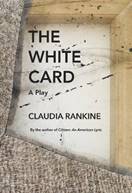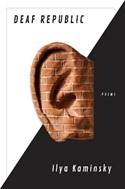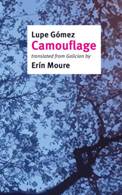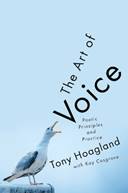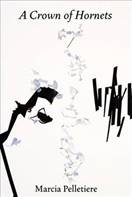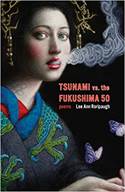Since 1996 Volume XXII
MARCH
2019
EXEMPLARS
Poetry reviews by Grace Cavalieri
++++++++++++
The White Card,
a play by Claudia
Rankine.
Graywolf press. 89 pages.
Deaf Republic
by Ilya Kaminsky.
Graywolf Press.76
pages.
A Cry In The Snow
by Stella Vinitchi
Radulescu.
Translated by Luke Hankins. Seagull Press. 73 pages.
Nouns & Verbs, New
and Selected Poems
by Campbell
McGrath.
HarperCollins. 272 pages.
Still Life With
Mother And Knife
by Chelsea
Rathburn.
LSU Press. 67 Pages.
Camouflage
by Lupe Gómez,
translated by Erin Moure. Circumference Books. 105 pages.
The Art of Voice:
Poetic Principles and Practice
by Tony Hoagland
with Kay Cosgrove. W.W. Norton &Co. 160 pages.
A Crown of Hornets
by Marcia
Pelletiere. Four Way Books. 70 pages.
Tsunami vs. The
Fukushima 50
by Lee Ann
Roripaugh. Milkweed Editions. 95 pages.
Intrusive Beauty
by Joseph J.
Capista.
Ohio Univ. Press. 75 pages.
Also listed with March’s
Best Books:
Nancy Huxtable Mohr,
Rigoberto González,
Jessica Jacobs, Diane
Mehta.
+++++++++++++
The White Card,
a play by Claudia
Rankine.
Graywolf press. 89 pages.
A major voice in American poetry has turned to playwriting. Rankine
knows how to do it – taking a powerful topic and putting it in the hands
of epitomized characters. Her characters include an American
businessman, and his family, who wish to buy the latest work of art by a
celebrated African-American artist. Theater is about ideas and the
conflict that polarizes its people, and it helps that Rankine has the
gift of dialogue and a subject no one can look away from. It’s
the white card that dogs our
society when do-gooders are wrongheaded proving, over and again, that
all motion is not progress. The wealthy people in Rankine’s play try
hard to understand why they’re not wonderful and progressive: they walk
the walk, yet inherently aren’t able to grasp racial nuance. As the
great poet Sterling Brown once said: “They mean so well, but they do so
poor.” In fact, well-meaning
could be a character in this play. Only the son (i.e. the next
generation) fathoms the difficulties. Rankine’s play shows that even
today we cannot agree on the basic facts of race relations; and we have
a long way to go to assume healthy responsibility. The play is about
viable conversations that fail-- if, say, a philanthropic art owner owns
private prisons but wants ‘to help black people’ – and if human rights
and humanity are not seen as the same thing. But, for now, we have this
play that opens it all up; and this exposure of differences is where we
begin – as we now begin, over and over.
++++++++
Deaf Republic
by Ilya Kaminsky.
Graywolf Press.76 pages.
Former Soviet citizen Kaminsky writes of authoritarianism, military
invasion, and resistance in a harrowing tale involving puppets,
puppeteers, lovers, and children. The writer writes what we don’t want
to hear; and makes it something we cannot live without hearing. The
villagers’ resistance is to make up a language the soldiers cannot
understand, using deafness as a weapon of power. This is so true of many
stories where victims coalesce to be victors– yet, with oppression and
violence in enemy occupation there’re no human aspiration – only whose
blood flows and when. Especially effective are Momma Galya’s puppeteers
who strangle soldiers (after sex) with puppet strings.
Kaminsky’s written a work that’s
a symbol of all times when one dominant force overtakes a people.
Throughout history, victims will always develop a codified message to
endure and sustain. Kaminsky’s writing is one percent sociology and 99%
poetic genius – making explosive realities manageable -- even when
writing of cruelty-- giving us lines that are so gorgeous, and original,
and breathtakingly visual, we marvel at the human being who wrote them.
Value added. In the notes at the book’s end is this: “ON SILENCE: Deaf
people don’t believe in silence. It is the invention of the hearing.”
Firing Squad
On balconies, sunlight. On
poplars, sunlight, on our lips.
Today no one is shooting.
A girl cuts her hair with imaginary scissors—
the scissors in sunlight, her hair in sunlight.
As soldiers wake and gape at us gaping at them,
what do they see?
Tonight they shot fifty women on Lerna Street.
I sit down to write and tell you what I know:
a child learns the world by putting it in her mouth,
a girl becomes a woman and a woman, earth.
Body, they blame you for all things and they
seek in the body what does not live in the body.
+++++++++++++++++++++
A
Cry In The Snow
by Stella Vinitchi
Radulescu.
Translated by Luke Hankins. 73 pages.
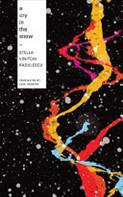
The poet lived during the communist regime in Romania and brings her
sense of dread and survival into a meditative journal. Radulescu begins
her book with speculation on her existence, corporality, and mortality.
She writes the poetry of her culture using her own processes as central.
Imagistic and beautiful, the poems create moments of reverie and
melancholy. These are patient observations and internal monologues –
they speak of a larger presence – the competing realities of a life
limited in freedom except for the imagination and the pen.
what
life on earth is all about
in the
garden among leaves
have
the birds gone away?
where
is this noise at the bottom of the ocean coming from
this
avalanche of human forms?
enough?
of course not, it’s starting again
the
empire is drowning
they’re
hanging innocents
and
it’s up to the wind to listen to their cries
to soften their souls
+++++++++++++
Nouns & Verbs, New and Selected Poems
by Campbell
McGrath.
HarperCollins. 272 pages.

Don’t bother looking for any words today. Campbell McGrath has them all,
and then some. He can craft formally, bop playfully, and speculate
philosophically. He’s known for the long form, the prose poem, social
commentary, and nostalgia – once I worried about slander when he wrote
an exegesis about the Chuck E. Cheese establishment, but thankfully
those people don’t read poetry. The intellect is the thing with McGrath,
but the best part is we don’t know it’s there, as we’re on the roller
coaster of his ideas and verbiage and never want to stop to find who’s
running the machinery.
I’ve known his work for 30 years so I started reading the new poems
first, and they are new, but thankfully they have semblances of former
poems – a sweet smartass approach to life’s degradations, and an
astounding encyclopedic mind for science, literature and pop culture.
You can find a ‘happy meal’ in a soliloquy, or poems written at ‘Jiffy
Lube, – then find a ‘Smirnoff’ or ‘Bruce Springsteen’ deepening a poetic
thought. You can also find eloquence and lyricism, enough to take your
breath away. He simply has it all.
McGrath is ubiquitous, although he’d be able to do something more
spectacular with that word – his craft is impeccable when he wants it to
be – he’s incorrigible and lovable – he’s an American patriot trying to
shape up the country from its television to its most elemental problems.
This book is McGrath’s roadmap and is worth the trip. He did win the
MacArthur “genius” award once, and I second that award.
The
Human Heart
We
construct it from tin and ambergris and clay,
ochre, graph
paper, a funnel
of ghosts,
whirlpool
in a
downspout full of midsummer rain.
It is,
for all its freedom and obstinance,
an artifact of human
agency
in its maverick
intricacy,
its
chaos reflected in earthly circumstances,
its
appetites mirrored by a hungry world
like the lights of
the casino
in the coyote’s eye.
Old
as the
odor of almonds in the hills around Solano,
filigreed and chancelled with flavor of blood oranges,
fashioned from
moonlight,
yarn, nacre,
cordite,
shaped
and assembled valve by valve, flange by flange,
and
finished with the carnal fire of interstellar dust.
We build the human
heart
and lock it in its
chest
and
hope that what we have made can save us.
++++++++
Still Life with
Mother and Knife
by Chelsea
Rathburn.
LSU Press. 67 Pages.
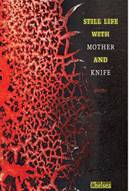
I’m so glad I’ve read Rathburn, to be reminded once again how poetry can
encapsulate story powerfully, formalizing events, making them well worth
it. Everyone has childhood memories and discordant pasts; then why do
this poet’s gifts seem incomparable? As if no one has experienced it all
quite well enough before? It could be her craft and form, invisible to
the eye and ear, holding feeling and language together with a special
chemistry.
Deft explorations into the soul are not for everyone – not even for all
poets – examining shame, humiliation, blame. Only the richest mind can
refashion into vivid tableaux. We might see Rathburn as a visionary for
the way she converts circumstance into hologram – the actual is
transformed by language’s internal radiance – so careful, so exact,
unaware of its utility.
Knowledge of the visual arts is everywhere; and one long poem on
Delacroix’s “Medea” is a masterwork. Mother and child are the source and
subject of Rathburn’s poems – the push/pull of emotions – the shared
knife – but unlike Medea we do not kill, we find the divine; the only
way this art can be described—a collection of poems with the divine.
Variations on a Theme:
Delacroix’s Medea, 1820 – 1862
Part ll.
For
years he seeks a way into the work.
He
sketches the children sucking at her breasts,
he
studies her neck and torso, turning her
this
way and that, in motion and repose.
Why am I not a poet? the
painter writes.
But at least let me feel as much
as possible
in each of my paintings, what I
wish to produce
in the souls of others. He
draws the dagger
from
every angle but does not let her use it.
It’s
always the moment just before she kills.
Camouflage
by Lupe Gómez,
translated by Erin Moure. Circumference Books. 105 pages.
On each page are two poems, one written in Galacian, and its counterpart
in English. Sometimes the poems are only one line: “death was a white
horse bathing in a river;” and every page is beautiful. The theme is
grief – a mother’s death – but the story is birth, the life from this
mother and an unspoiled village not touched by modern configurations – a
rural land that still carries on its ancient practices. This is a
treasure of language imagined, and translated with an exquisite hand. It
constantly amazes how few words can be said to open up a world. It’s
apparently the poet’s sacred obligation to preserve her language, her
culture, shaping contours of meaning from fragments of thought – each
word precise to its mission.
You had no dreams
because women in villages don’t dream.
The economic backwardness of Galicia
was a form of artistic avant-garde.
++++++++++++++++++++++
The Art of Voice: Poetic Principles and Practice
by Tony Hoagland
with Kay Cosgrove. W.W. Norton &Co. 160 pages.
Hoagland was one of our most energetic and beloved writers who died
recently, leaving this “craft guide” with dozens of poems referenced,
and his own personal explorations and explanations. The book is about
‘Voice’ in 12 chapters: Showing
the Mind In Motion; The Sound Of Intimacy; The Warmth of Worldliness;
The Tribal Bond of The Vernacular; etc. As we see, the mysterious
subject “WHAT IS VOICE,” heard in every classroom, is answered
thoughtfully, from various perspectives. Hoagland is said to have been a
superior teacher – a final chapter is on “Prompts, Exercises and
Skillbuilding,” and Hoagland infuses his own versatility and effortless
elegance in sharing his knowledge. Tony Hoagland’s own voice beams from
the page, invested, influential, strong, imperative – just the way we
like to remember him.
“One of the most difficult to define elements in
poetry is voice, the distinctive
linguistic presentation of an individual speaker.
In many poems
voice is the mysterious atmosphere that makes it memorable, that holds
it together and aloft like the womb around an embryo.
Voice can be more primary than any story or idea the poem
contains, and voice carries the cargo forward to delivery.
When we hear a distinctive voice in a poem, our full attention is
aroused and engaged, because we suspect that here, now, at last, we may
learn how someone else does it—that is, how they live, breath, think,
feel, and talk.”
++++++
A Crown of Hornets
by Marcia
Pelletiere. Four Ways Books. 70 pages.
Without self-pity, these poems chart the course of a wounded brain
coming to life from injury. Each poem is a genuine straightforward
account of this reckoning. Where is wellness and how does it feel? The
whole person and the damaged person coexist, composing a series of
elements – fear, sorrow, memory loss— but from all, emerges strong clear
writing that lives the only life it has, and does it meaningfully.
The Habit of
We put on crinkled patient gowns
and clicked the snaps, each time,
like children, obedient,
accepting what we got.
Finally, the strangers
finished reaching underneath
our paper sleeves, said we
could take them off for good,
but after so much time
in those light robes, we paused
before we moved into
the lack of them, the letting go.
++++++++++
Tsunami vs. The
Fukushima 50
by Lee Ann
Roripaugh. Milkweed Editions. 95 pages.
“This book is a tribute to, in memory and honor of, the victims and
survivors of the 2011 Tohoku earthquake and tsunami, and the subsequent
Fukushima Daiichi nuclear disaster.”
When a tsunami hit a nuclear plant (Fukushima
Daiichi), 50 stayed, risking their lives, to man the reactors.
Natural elements are beyond human scale. Maybe that’s why we need poetry
that encapsulates so much and provides the only shelter we have from
calamity. Roripaugh uses our oldest beliefs to confront the disruption
of nature’s harmony. Characters and situations are her choice of tools
as she tackles an enormous task. Fortunately, she’s equal to the painful
subject with good technical skills and an ability to find subtleties
within a horrible story. Some poets were destined to write something on
a timescale we cannot even imagine and yet make it germane to every
moment. Part historian, mostly artist, this poet restores life from the
rubble.
hulk
small
because
it was afternoon
and I
was at the carnation farm
when
the earthquake struck
because
by the time I arrived
back
home to help my family
traffic
jams had clogged shut
the
main arterial roads leading
inland
from Futaba-machi
because
when the tsunami
breached the sea wall,
and
concrete disintegrated like
strewn
chunks of soft plywood,
we had
to leave our car
and
flee for higher ground
because
the elevated hill
marked
as the evacuations point
for an
elementary school
seemed
like it should be safe,
until
the tsunami rose like
a
thundering wall of water
and
blotted out the sky
because
there wasn’t time
for us
to climb all the way
+=========
Intrusive Beauty
by Joseph J.
Capista.
Ohio Univ. Press. 75 pages.
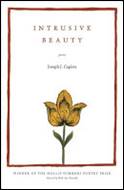
Capista has his hand on all aspects of this art. His craft is
impeccable, often witty, and always refreshing. The poet shows extreme
versions of himself – he can lullaby you with perfect tone in moments of
tranquility; he can write social issues via poetry; he writes
referendums on college teaching and his students. The poems allow an
emotional exposure, so the reader has full access to thoughts behind the
line. Some poems are simple; some complex – Capista has a certain gift
to allow quiet around experience and this has to do with word choice and
aesthetics on the page. Most of all, we find the poet expresses
essential goodness in daily acts, and takes on this art to prove it to
us. This is a reward for the writer and the reader.
History of the Inevitable
Fire wants to be ash, which wants
a bucket to hold it with unsleeping certainty.
The bucket wants to look like the moon,
which it does some nights, while the moon
wants to be the storefront window, full
of something. But the
window’s coats
are tired of town’s dull hooks and long
to be pitchforks, which long to be trees.
The trees envy the slow-moving cow
beneath their boughs, and the cow wants
an engine to propel it though the sharp
fence where the man rests, wondering
how he will ever go to his desire when
the universe so needs his tending hand.
+++++++++
Also, Best Books for March:
The Well: Poems from Twin Pines Farm
by
Nancy Huxtable Mohr.
Butternut Press, 106 Pages.

Honoring the farm women of family lineage from the 1700’s to present
time, Mohr immortalizes history and tiny acts that create the past.
“Storms coming but the tubs/ are
full—one wash, the other butter/ for you on the next train…”
One
Minute More
A man
and a woman sit
after
dinner, stare at sun’s
reach
over oak crusted hills,
the
long light on green lawn.
They
drink wine and talk
of
those not seen in years,
of hope
and not despair.
The
dusk around them
holds
itself taut, as robins
search
for their evening meal.
Let’s not go in yet, he begs.
One minute more.
+++++++++++++
Best
Books from Four Way Books:
Take Me with You,
Wherever You’re Going
by Jessica Jacobs.
109 pages.

A powerful autobiography of friendship, love, marriage;
“…we knew what we were getting
into. Each of us/ holding the hand of the most/ stubborn person we knew,
the only one capable/ of wrenching the other/ greater than the sum of
her parts…”
Leaving
Home
The koi
were killed by a possum killed by
our
dog, whose barks brought my dad to the dark
yard,
along with me—his stand-in son, his
midnight shadow. In the
glower of the flashlight,
the
dog’s eyes were red and rolling, the possum’s
fur
bright as an errant scrap of daylight.
The dog
wouldn’t put it down, bent the pipe
of the
pool skimmer my father used to lever
the
body free from his jaws. My
parents
gave
the dog away soon after.
Because, I suspect,
wildness can live in the suburbs only so long
as it
doesn’t bare its teeth; so long as when the light
finds
it, it drops its prey and wags its tail;
so long
as we confine our darkness to the dark.
+++++++++++++
Forest with Castanets
by Diane Mehta.
96 pages.

From the essay “Sex & Sensibility:”
“…The
sexual vulnerability so specific to postdivorce love is the very thing
that rekindles your relationship to experience, but it is also what
makes you that much more lonely…”
Dirt Maid
My
tough blue hands are veined with a thousand rivers
navigated or drowned in.
But I
have roots to care about, moss to take me in;
earth-maid, dirt-maid, pages of trees grow within.
Chasing
down my blue-dark conversations,
cockatoo creations, I ration thought, chase elation.
Lakes
move in their reflections of trees
where
light swims with full-floating ease.
A
thousand years from now,
love
will wonder why it ever lost its vigilance.
Perhaps: dream-crazy
midnights, illicit scenes,
walking
roughly into grief, casketed in it.
While
stars telescope me into new geography.
Gravity
claims down trees and follows me.
++++++++++
The Book of Ruin
by
Rigoberto González.
86 pages.

A book of pain and
sorrow expiated by lyricism. “…
I’m simply an entity misunderstood, I only do/what you do to me. Since I
am no longer free, /the cloud of me becomes the shroud of you.”
Portrait of a Father After His Son’s Memorial Service
There’s a man who sits on a bench
waiting for a train, though the trains
arrive and depart and the man remains
seated, the heaviness of resignation on
his face. As evening falls
the light flickers
awake in the waiting room and a moth
begins to flutter in and out of sight
until it rests finally on the white bulb
above his head. All things
come to calm
this way—even the trains.
The cycles
of grinding metal stretch out into yawns—
each iron wheel a flower folding its petals in.
Night concludes its hymn.
The man rises but
hesitates to leave this station of his cross.
++++++++++
Grace Cavalieri is Maryland’s
tenth Poet Laureate. She founded and still produces “The Poet and the
Poem,” now from the Library of Congress, celebrating 42 years on-air.
Her latest book of poems and plays is “Other Voices, Other Lives,”
a compendium of poems and plays. (Alan Squire Publisher, 2017.)
PoetryMagazine.com is published by Gilford Multimedia LLC
Mary Barnet
Andrena
Zawinski
Grace Cavalieri
Joan Gelfand
Janet Brennan
Reviews
Video
Podcasts
Submissions
Advertising

